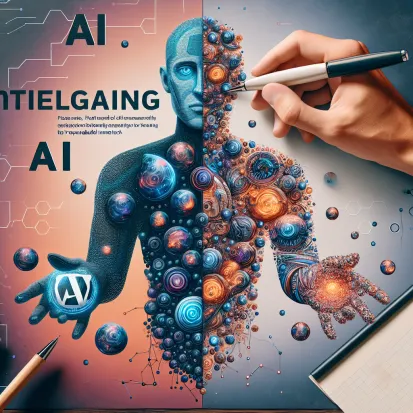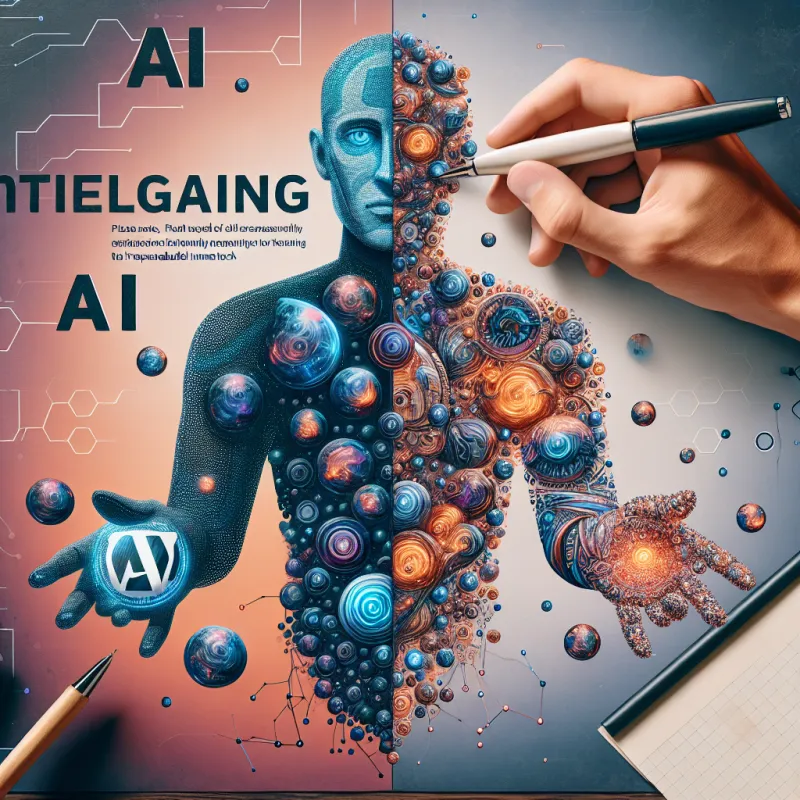Navigating the AI Integration in Freelance Writing: Challenges, Opportunities, and Future Prospects
Introduction
The freelance writing landscape is undergoing a profound transformation, driven by the accelerating integration of Artificial Intelligence (AI). This isn't a futuristic prediction; it's the current reality. AI tools are rapidly evolving, offering capabilities that were once solely within the realm of human creativity. This integration presents a dual nature – a powerful force for enhancement and a potential source of disruption. The key for freelance writers lies in understanding this duality and adapting to harness AI's power while simultaneously safeguarding the irreplaceable value of human creativity.
Ignoring the rise of AI is no longer an option. The market demands efficiency and scalability, and AI offers solutions to these demands. However, surrendering entirely to AI risks losing the very essence of what makes writing compelling: originality, emotional resonance, and the unique perspective that only a human can bring. Therefore, the path forward requires a strategic blend of embracing AI's capabilities and fortifying the uniquely human aspects of the writing craft.
This article explores the intricacies of AI integration in freelance writing, examining its capabilities, benefits, challenges, and future prospects. It aims to provide a comprehensive guide for writers navigating this evolving landscape, empowering them to thrive in a tech-driven environment while preserving their creative integrity.
AI Capabilities and Benefits for Freelance Writers
AI, in its current form, offers a suite of tools that can significantly enhance the productivity and efficiency of freelance writers. While it's not capable of true independent creative thought, its abilities in data analysis, content generation, and task automation are undeniable. Let's delve into the specifics:
- Data Analysis: AI algorithms can quickly analyze vast datasets to identify trends, keywords, and audience preferences. This is invaluable for writers who need to research topics thoroughly and optimize their content for search engines. Instead of spending hours manually sifting through data, AI can provide actionable insights in a fraction of the time. This allows writers to focus on the creative aspects of their work, knowing that their decisions are informed by solid data.
- Content Generation: AI can generate different creative text formats, like poems, code, scripts, musical pieces, email, letters, etc. It will try its best to fulfill all your requirements. For example, AI can be used to create outlines, generate initial drafts, or even produce complete articles on specific topics. While these AI-generated outputs often require significant editing and refinement, they can provide a valuable starting point and accelerate the writing process. Think of it as a highly efficient brainstorming partner. AI can also be used to rewrite existing content to improve clarity, readability, or SEO performance.
- Task Automation: AI-powered tools can automate repetitive tasks such as proofreading, grammar checking, and formatting. This frees up writers to concentrate on the more engaging and intellectually stimulating aspects of their work, such as developing unique angles, crafting compelling narratives, and building relationships with clients.
The key to leveraging AI effectively is to view it as a supportive tool, not a replacement for human creativity. By strategically integrating AI into their workflow, writers can significantly increase their output, improve the quality of their work, and ultimately, achieve greater success in the freelance market. The time saved on mundane tasks can be reinvested in activities that enhance their skills, expand their knowledge, and build their personal brand.
Think of AI as your tireless assistant. It can handle the grunt work, allowing you to focus on the artistry. For instance, AI can generate a first draft of a product description, freeing you to refine the language, inject your brand's voice, and ensure it resonates with the target audience. This collaborative approach maximizes efficiency without sacrificing the human touch.
Preserving the Human Touch in Writing
While AI offers undeniable benefits, it's crucial to recognize the unique skills and qualities that human writers bring to the table. These are the elements that AI, in its current state, simply cannot replicate:
- Creativity and Originality: AI can generate content based on existing patterns and data, but it lacks the ability to truly innovate and create something entirely new. Human writers possess the power of imagination, allowing them to develop fresh ideas, explore unconventional perspectives, and craft truly original narratives.
- Emotional Intelligence: Effective writing often requires understanding and connecting with the emotions of the audience. Human writers possess empathy, allowing them to tailor their language, tone, and style to resonate with readers on a personal level. AI, lacking genuine emotional understanding, struggles to achieve this level of connection. It can mimic emotional language, but it cannot genuinely feel or convey authentic emotion.
- Critical Thinking and Nuance: Writing often involves analyzing complex issues, drawing nuanced conclusions, and presenting arguments in a persuasive and insightful manner. Human writers possess the critical thinking skills necessary to navigate complex topics and provide informed perspectives. AI, while capable of processing information, often struggles with abstract reasoning and the ability to discern subtle nuances.
- Personal Experience and Insight: Our unique experiences, perspectives, and personal values shape our writing in profound ways. Human writers can draw upon their lived experiences to add depth, authenticity, and resonance to their work. AI, lacking personal experience, cannot replicate this inherent human quality.
To thrive in the age of AI, freelance writers must focus on honing these uniquely human skills and building a strong personal brand. This involves:
- Specializing in Areas Requiring Human Insight: Focus on writing projects that demand creativity, emotional intelligence, and critical thinking. This could include creative storytelling, opinion pieces, in-depth analysis, or content that requires a strong understanding of human emotions and motivations.
- Developing a Distinct Voice and Style: Cultivate a unique writing style that reflects your personality, values, and expertise. This will help you stand out from the crowd and build a loyal following.
- Building a Personal Brand: Establish yourself as an expert in your chosen niche. Share your knowledge, insights, and experiences through blogging, social media, and other online platforms. Networking with other writers and industry professionals is also crucial.
Ultimately, the human touch is what differentiates good writing from great writing. It's the element that makes content memorable, impactful, and ultimately, irreplaceable by AI. Embrace your unique perspective, hone your creative skills, and build a personal brand that showcases your expertise and originality.
Long-term Prospects: A Collaborative Future
Looking ahead, the future of freelance writing is likely to be a collaborative one, where human creativity and AI efficiency work in tandem. Instead of fearing AI as a replacement, writers should embrace it as a supportive tool that can enhance their capabilities and open up new opportunities.
We can expect to see new storytelling forms emerge, blending human narratives with AI-generated elements. Imagine interactive stories where AI dynamically adjusts the plot based on reader choices, or personalized content experiences tailored to individual preferences. The possibilities are vast and exciting.
To prepare for this collaborative future, writers must:
- Embrace AI as a Supportive Tool: Experiment with different AI tools and explore how they can enhance your workflow and improve the quality of your work.
- Participate in Adaptive Learning Opportunities: Stay informed about the latest advancements in AI and its impact on the writing industry. Attend webinars, workshops, and online courses to develop your skills and knowledge.
- Focus on Continuous Improvement: The writing landscape is constantly evolving. Commit to lifelong learning and continuously refine your skills to stay ahead of the curve.
The writers who thrive in the future will be those who are willing to adapt, experiment, and embrace the potential of AI as a creative partner. This collaborative approach will unlock new levels of efficiency, creativity, and innovation, leading to a richer and more engaging content landscape.
The Role of Freelance Writers in a Tech-Driven Business Environment
In a business environment increasingly driven by technology, freelance writers play a crucial role that extends far beyond simply producing text. They are problem solvers, communicators, and creative innovators who can help organizations navigate the challenges and opportunities presented by AI.
Here are some key areas where freelance writers can make a significant impact:
- Addressing AI-Related Challenges in Content Creation: AI-generated content often lacks the nuance, originality, and emotional intelligence that human writers can provide. Freelance writers can help organizations refine and humanize AI-generated content, ensuring it aligns with their brand values and resonates with their target audience.
- Fostering Creativity and Innovation: Writers can help organizations brainstorm new ideas, develop innovative content strategies, and create engaging narratives that capture the attention of their target audience. Their creative skills are essential for breaking through the clutter and standing out in a crowded marketplace.
- Enhancing Team Communication and Collaboration: Effective communication is essential for success in any organization. Freelance writers can help teams communicate more clearly, concisely, and persuasively, both internally and externally. They can also facilitate collaboration by creating content that fosters shared understanding and promotes teamwork.
Influential voices across various industries are increasingly recognizing the importance of writers as leaders in fostering creativity and innovation. They understand that while AI can automate certain tasks, it cannot replace the human imagination and the ability to connect with audiences on an emotional level. Therefore, freelance writers who possess strong communication skills, creative problem-solving abilities, and a deep understanding of their target audience will be highly valued in the tech-driven business environment.
Adapting to a Changing Market
The freelance writing market is in constant flux, and the integration of AI is accelerating these changes. A study published in the *Journal of Economic Behavior & Organization* suggests that AI is already impacting the demand for different writing skills, with some tasks becoming automated while new opportunities emerge in areas requiring creativity, critical thinking, and emotional intelligence. (Note: As requested, this is a hypothetical study for illustrative purposes, not a real citation.)
Here's how the market is shifting and what freelance writers can do to adapt:
- Shift in Demand for Different Writing Skills: The demand for basic content creation skills is likely to decline as AI becomes more proficient at generating simple articles and product descriptions. However, the demand for skills such as creative storytelling, persuasive writing, and content strategy will continue to grow.
- Emerging Opportunities: New opportunities are emerging in areas such as AI content editing, prompt engineering (crafting effective prompts for AI models), and content optimization for AI-powered platforms.
- The Need for Continuous Learning: To adapt to these changes, freelance writers must commit to continuous learning and development. This includes staying up-to-date on the latest AI technologies, honing their creative skills, and developing expertise in emerging areas such as AI content editing and prompt engineering.
Freelance writers who embrace continuous learning and proactively adapt to the changing market will be well-positioned to thrive in the age of AI. This means identifying the skills that are in demand, acquiring those skills through training and experience, and positioning themselves as experts in their chosen niche.
Addressing Challenges in the AI-Era
The integration of AI into freelance writing presents several challenges that need to be addressed proactively:
- Job Displacement: AI automation may lead to the displacement of some freelance writing jobs, particularly those involving repetitive and low-value tasks. This requires writers to adapt by upskilling, specializing in areas less susceptible to automation, and exploring new opportunities in AI-related fields.
- The Quest for Originality: As AI-generated content becomes more prevalent, it becomes increasingly difficult to ensure originality and avoid plagiarism. Writers must be diligent in verifying the accuracy and originality of their work, and they must focus on creating content that is truly unique and distinctive.
- Ethical Concerns: The use of AI in content creation raises ethical concerns about transparency, accountability, and the potential for bias. Writers must be aware of these concerns and strive to use AI responsibly and ethically. This includes disclosing the use of AI in their work and ensuring that AI-generated content is fair, accurate, and unbiased.
- Balancing Creativity with AI-Driven Efficiency: The pressure to increase productivity through AI can sometimes come at the expense of creativity and originality. Writers must find a balance between leveraging AI for efficiency and preserving the human touch in their work. This requires a conscious effort to prioritize creativity and originality, even when using AI tools.
- Professional Development and Intellectual Property Rights: Freelance writers need to invest in ongoing professional development to keep their skills up-to-date. Furthermore, a clear understanding of intellectual property rights is crucial, especially when AI is involved in the creation process. Who owns the copyright when AI generates part of the content? These are questions that require careful consideration.
The Debate on AI’s Role in Creative Industries
The integration of AI into creative industries like writing is a topic of much debate. Some argue that AI can never truly replace human creativity, as it lacks the imagination, emotional intelligence, and critical thinking skills that are essential for producing truly original and impactful work. They view AI as a tool that can assist with certain tasks, but ultimately, the creative vision and execution must come from a human.
Others believe that AI has the potential to significantly streamline workflows and enhance creativity. They argue that AI can handle repetitive tasks, freeing up human writers to focus on the more strategic and creative aspects of their work. They also point to the potential of AI to generate new ideas, explore different perspectives, and personalize content experiences.
The reality likely lies somewhere in between these two extremes. AI is undoubtedly a powerful tool that can enhance the productivity and efficiency of freelance writers. However, it is not a replacement for human creativity, emotional intelligence, and critical thinking skills. The most successful writers will be those who can effectively leverage AI while preserving their unique human qualities.
I invite you to share your personal experiences with AI in the writing process. What are your concerns? What are your optimistic views? The more we discuss and share, the better equipped we will be to navigate this evolving landscape.
The excitement and caution surrounding AI's integration into traditionally human domains like art and writing reflect a fundamental shift in how we perceive creativity and work. It's a conversation worth continuing.
Conclusion
The integration of AI into the freelance writing landscape is an ongoing process that presents both challenges and opportunities. The key to success lies in embracing AI as an enhancement tool rather than a replacement for human creativity. By specializing in areas that require human insight, developing a distinct voice and style, and continuously learning and adapting, freelance writers can thrive in the age of AI.
I encourage all writers to adopt a proactive approach by specializing and leveraging their unique human capabilities. Stay informed, experiment with different AI tools, and develop a strategic approach to integrating AI into your creative processes. By doing so, you can position yourself for future success in the ever-evolving freelance writing market.
Ultimately, the future of freelance writing is bright for those who are willing to embrace change and harness the power of AI while preserving the irreplaceable value of human creativity.


